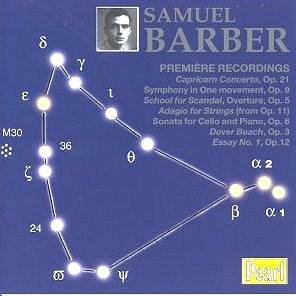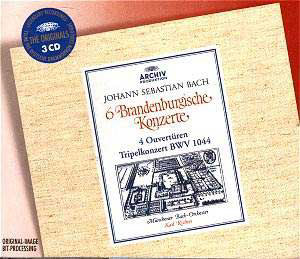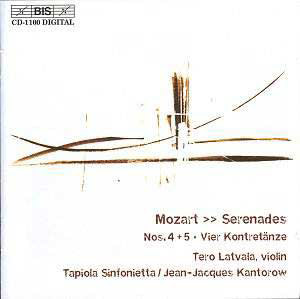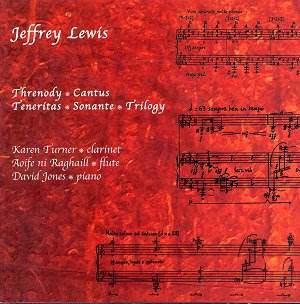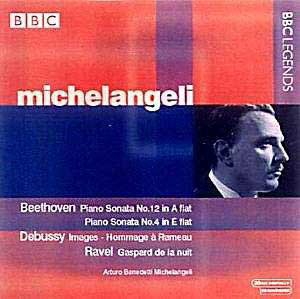 Composer: Ludwig van Beethoven, Claude Debussy, Maurice Ravel
Composer: Ludwig van Beethoven, Claude Debussy, Maurice Ravel
Works: Piano Sonata No. 12 in A flat major, Op. 26; Piano Sonata No. 4 in E flat major, Op. 7; Hommage à Rameau; Gaspard de la nuit
Performers: Arturo Benedetti Michelangeli, piano
Recording: Royal Festival Hall, London, 13 April 1982 (Beethoven, Debussy); BBC Studios, Maida Vale, London, 30 June 1959 (Ravel)
Label: BBC Legends
Arturo Benedetti Michelangeli’s interpretations of Beethoven, Debussy, and Ravel embody a confluence of technical prowess and profound emotional insight, as evidenced in this exceptional release from the BBC Legends series. Celebrating its one-hundredth installment, this disc offers a compelling glimpse into Michelangeli’s artistry, recorded during his illustrious career. The juxtaposition of Beethoven’s robust, structural clarity with Debussy’s ethereal impressionism and Ravel’s vivid colorations showcases not only the breadth of Michelangeli’s interpretative range but also the distinct musical lexicons of these composers.
The performances of Beethoven’s Piano Sonatas, particularly Op. 26 and Op. 7, are marked by Michelangeli’s meticulous attention to the nuances of phrasing and dynamics. In Op. 26, the tempestuous character of the music is vividly articulated, particularly in the third movement, which he delivers with a gripping intensity that evokes the starkness of a funeral march. The funeral march, characterized by its somber weight, is imbued with a sense of gravitas that transcends mere technical execution. Michelangeli’s ability to navigate the contrasting lyrical passages in the first movement reveals a delicate touch, enhancing the melodic contours and allowing for a rich interplay between the lyrical and the dramatic.
The Op. 7 Sonata further illuminates Michelangeli’s interpretative depth. The slow movement is a striking highlight, where he draws forth a kaleidoscope of tonal colors that resonate with eloquent expressiveness. Remarkably, the light touch he employed, as noted in the insightful liner notes, does not compromise the power of the climactic moments; rather, it serves to amplify the emotional contrasts inherent in Beethoven’s writing. The rondo finale is brimming with vivacity, as Michelangeli’s rhythmic precision and dynamic contrasts inject a lively energy that mirrors Beethoven’s own zest for life.
Transitioning to the Debussy, the performance of “Hommage à Rameau” reveals Michelangeli’s remarkable sensitivity to the composer’s unique sound world. The tonal palette he conjures is distinctly different from that of Beethoven, showcasing his versatility and mastery of the instrument. The playing is characterized by a fluidity and rhapsodic freedom, elements essential to capturing the essence of Debussy’s impressionistic style. The subtle variations in touch and color illustrate a profound understanding of the music’s atmospheric demands, further exemplifying Michelangeli’s artistry.
The Ravel selections, particularly “Gaspard de la nuit,” are nothing short of spectacular. Michelangeli’s interpretation of “Ondine” shimmers with an almost otherworldly quality, as the shimmering textures and fluid dynamics create an evocative soundscape that enchants the listener. “Scarbo,” in particular, showcases his technical brilliance; the portrayal of the character is vivid, embodying a narrative of sneering malevolence. The delicate yet fearsome execution in the opening bars prepares the listener for the tempest that follows, underscoring Michelangeli’s ability to create acute dramatic contrasts within the music.
The recording quality varies between the two sessions, with the 1982 Royal Festival Hall performance benefiting from superior sonics that capture the resonance and nuances of Michelangeli’s playing with remarkable clarity. The early Ravel recording, while slightly less vibrant, is nevertheless acceptable and allows the listener to appreciate the artistry within the constraints of its era. Background noise from the audience is present but does not significantly detract from the magnetic performances.
Each piece presented in this anthology stands as a testament to Michelangeli’s greatness, rendering this CD a distinguished milestone in the BBC Legends series. The performances are not only technically impressive but also intellectually stimulating, inviting listeners to engage deeply with the music. This collection cements Michelangeli’s status as one of the 20th century’s preeminent pianists, delivering a compelling narrative through each work. The interpretations displayed here are remarkable, reflecting the essence of the composers while revealing the artistry of a master pianist at the height of his powers.
